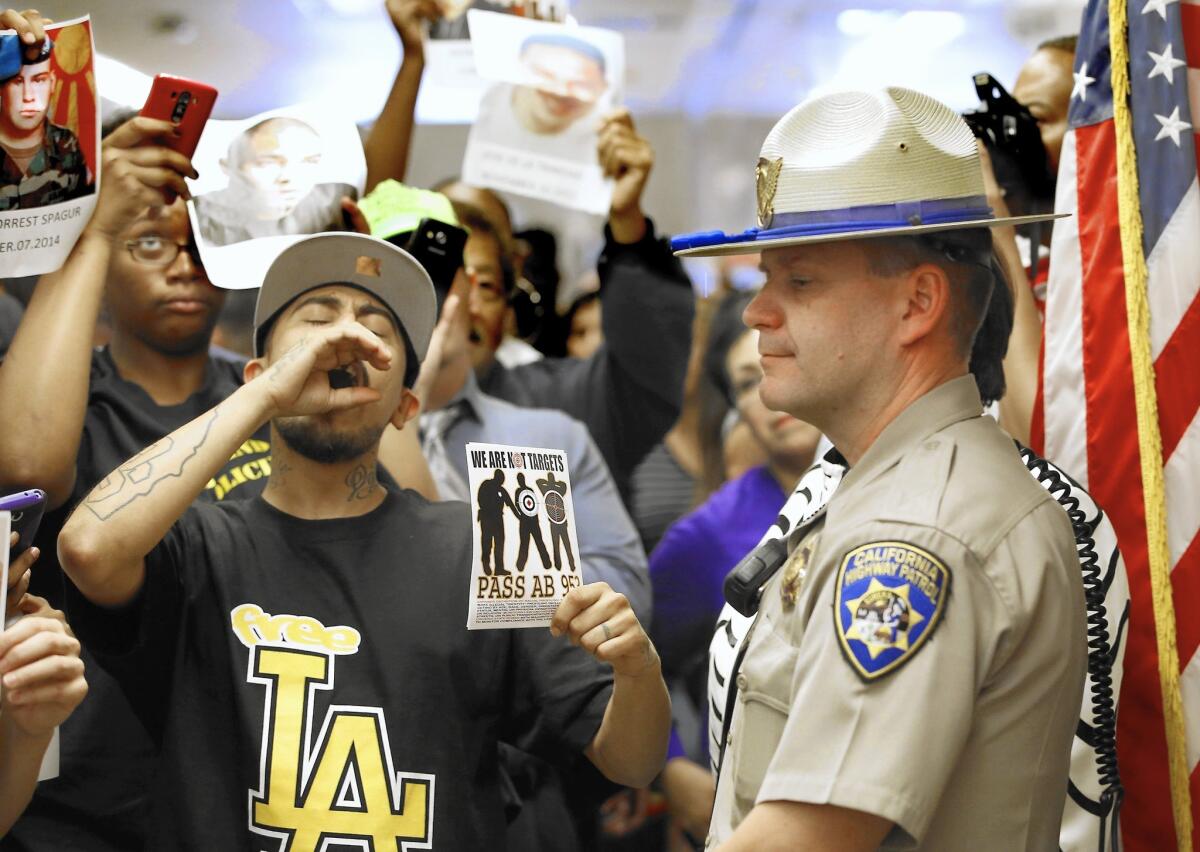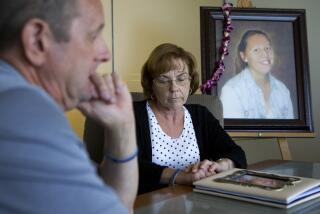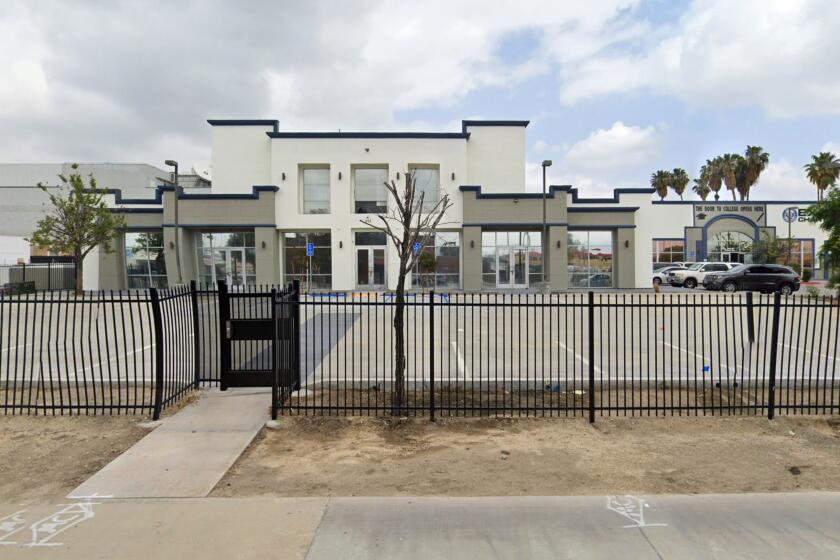California’s racial profiling law is ‘terrible’ legislation, police officials say

California is about to tackle head on the charged issue of racial bias in law enforcement.
Gov. Jerry Brown this weekend signed legislation mandating that California law enforcement agencies collect — and make public — data on the racial makeup of all those encountered by police.
For civil rights activists, Brown’s action was a big step toward protecting minorities from racial profiling.
For many in law enforcement, the measure creates a massive new bureaucratic headache that will do little to illuminate the question of whether police treat minority groups fairly.
“It’s a terrible piece of legislation,” said Lt. Steve James, president of the Long Beach Police Officers Assn. and the national trustee for the California Fraternal Order of Police.
Written by Assemblywoman Shirley Weber (D-San Diego) in response to fatal police shootings of unarmed black men and other people of color, the legislation will require officers to collect data on anyone they stop, including “perceived” race and ethnicity, the reason for the encounter and whether arrests were made.
Law enforcement organizations, including the state Fraternal Order of Police and the 65,000-member Peace Officers Research Assn. of California, had asked Brown to veto the bill, AB 953, arguing among other things that its reporting requirements would be burdensome to police and costly to taxpayers.
James echoed the sentiment.
“We have contact with the public all the time that requires no documentation, no paperwork,” he said. “Now, the amount of time we have to spend doing documentation and paperwork has gone up. The time doing menial tasks has gone up.”
The extra work will cut into the time officers spend on community policing, James said. He cited that as one of several flaws in the legislation, not least of which is that it addresses a problem he contends doesn’t even exist.
“There is no racial profiling. There just isn’t,” he said. “There is criminal profiling that exists.”
That position would be a hard sell to the bill’s supporters, who cited studies showing that unarmed black men are many times more likely to die by police gunfire than unarmed white men.
Rosa Aqeel, the legislative director of PICO California, a faith-based advocacy group that lobbied heavily for the law’s passage, said it will allow advocates and policymakers to quantify what until now has been anecdotal evidence.
“It creates a set of actual data that will allow us to see where racial profiling is happening,” Aqeel said, describing police officials who deny that racial profiling occurs as out of touch with reality.
“All I can say: Thank God this bill got signed and we’ll be able to look at the data and see what’s really going on,” she said. “We should all want to see the data so we can see how pervasive the problem is.”
The Los Angeles Police Department and other agencies have grappled for years with how to deal with accusations of racial profiling. But the new law requires a level of uniform reporting that goes beyond what has previously been collected.
A 2008 study of LAPD data by a Yale researcher found blacks and Latinos were subjected to stops, frisks, searches and arrests at significantly higher rates than whites, regardless of whether they lived in high-crime neighborhoods. Then-Chief William J. Bratton acknowledged isolated cases of profiling may occur but dismissed the notion of a widespread problem.
An earlier study found that Latino and African American drivers were much more likely than whites to be asked during LAPD stops to leave their vehicles and submit to searches. But the report’s authors said they could not determine whether this treatment was caused by racial or ethnic profiling.
Lt. Craig Lally, president of the union that represents Los Angeles police officers, called the new measure “another one of these feel-good laws” that will be impossible to enforce.
“Sometimes when people get pulled over they claim it’s because they are black, or Hispanic or white,” he said. “Unless you can get into the officer’s mind when he’s doing that traffic stop, there is no way to prove it was because of race — unless he or she admits it.... It is impossible to look at statistics and prove racism.”
Jack Glaser, a professor of public policy at UC Berkeley who wrote the 2014 book “Suspect Race: Causes and Consequences of Racial Profiling,” said the bill’s passage is significant for being a statewide effort at police data collection.
“A lot of different individual agencies collect [data], but they are rarely analyzed at an aggregate level,” Glaser said. “In terms of figuring out what practices are effective, you can’t do that unless you compare across departments.”
NEWSLETTER: Get essential California headlines delivered daily >>
Such a large statewide effort also enables analysts to make inferences about racial profiling. With a single-incident approach, he said, it can be difficult to establish that officers are using race, ethnicity or national origin as the basis for stopping someone.
“Knowing whether any one particular stop is based on race, you’d have to get into the mindset of the officer,” Glaser said.
A similar bill was vetoed in 1999 by then-Gov. Gray Davis. Glaser said that law enforcement objections to such data-collecting efforts have become less vigorous since then and that police leadership has begun to acknowledge the existence of racial profiling — even if the police unions have not.
Dozens of activists from groups including the Communities United Coalition, supporters of the “Black Lives Matter” movement, held vigils outside Brown’s office recently. Black Lives Matter arose after the fatal shooting of a black man by a white police officer in Ferguson, Mo., in August 2014.
“This will provide additional data,” Melina Abdullah, a professor of Pan-African studies at Cal State L.A., said of the new law. “If I were law enforcement I’d think of it as an opportunity to demonstrate that I wasn’t racially profiling, that we have a fair and equitable system. The resistance to it signals to me and many others that there is a lot of racial profiling going on.”
The racial profiling law was among 13 criminal justice bills the governor signed this weekend. Other legislation requires police agencies to issue detailed annual reports on all cases in which officers use force that results in serious injury or death. And police agencies whose officers wear cameras will have to follow rules on storing and using the video so it is not mishandled.
Earl Ofari Hutchinson, president of the Los Angeles Urban Policy Roundtable, said the “big question that is still kind of dangling” about the racial profiling bill is what action will be taken in departments where the data show the practice to be occurring.
“This is a great first step,” he said. “But the second step has to be to bring something into effect to put some teeth into it.”
ALSO
High school shooting plot foiled in Northern California, authorities say
Disneyland annual pass with no blackout days now costs more than $1,000
Nostalgia is served up at reopened Clifton’s cafeteria
More to Read
Start your day right
Sign up for Essential California for news, features and recommendations from the L.A. Times and beyond in your inbox six days a week.
You may occasionally receive promotional content from the Los Angeles Times.








